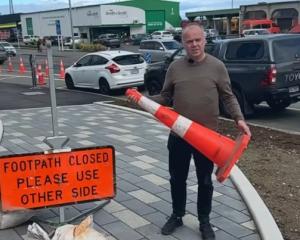The hysteria over Labour’s water policy is pitiful, Rachel Stewart writes.
Watching the bellyaching about Labour's water policy, you could be forgiven for believing the sky's about to fall. One thing's for sure, the bellyachers' free water ride may be over.
The politics of water is complex but far from impossible to achieve, and the spanner throwing from the competing interests is fierce.
Yet it's finally dawning on politicians how important the issue of degraded waterways is to voters, and how the tolerance tipping point has been reached.
The talking points from National's stalwarts are predictable but hysterical. Cabbages will be $18! There'll be a $75 water charge on your next bottle of wine! Dairy farmers will go broke! Labour hasn't done its homework! Devious and disgusting!
It's also why they use the word ''tax'' for what is a ''royalty'' - designed to ensure polluters will contribute towards paying for their pollution. Finally.
There's been much wailing around what price Labour will set. Let's just say the mathematics employed by some needs a bit of after-school help from a tutor.
Labour's water policy is not as difficult to understand as you might think.
The policy shows a royalty on bottled water based on a per-litre rate, and a royalty on irrigation water for every 1000 litres, or cubic metre, used. The money raised will be used to clean up waterways.
Jacinda Ardern has said should Labour be in a position to form a government after the election, she would meet affected sectors to set fair and proportionate rates.
Labour finance spokesman Grant Robertson and water spokesman David Parker say the likely rate for irrigators will be 1c to 2c per 1000 litres.
By any honest calculation this is about as far from onerous as it gets.
A couple of cents per 1000 litres will not bankrupt farmers or growers, and the toy-throwing is only serving to convince the public the cleaning up of our waterways is more important than ever.
I listen to each and every argument from the industry and, because I've been writing about water issues for years, I sit back and wait patiently for their predictable lines. They never disappoint.
''New Zealand farmers feed the world.'' No, they don't. They sell bulk milk powder to the (mostly) lactose-intolerant Chinese. Further, they need to get used to the future of synthetic milk and plant-based meat.
That's the future, and it's coming. Ready or not.
''We'll go broke.'' No, you won't. And if you do, you weren't sustainable anyway. You took on too much debt, and/or you're doing something very wrong.
''We are the backbone of the country.'' Tourism is the backbone now, so best adjust to the fact the two are incompatible. Clean, green, pure New Zealand? Pull the other one.
''We've spent a billion dollars in environmental initiatives.'' Prove it. I've asked for a breakdown many times and I've yet to see this random figure ever quantified. Still waiting.
''Urban waterways are more polluted than rural.'' Yes, they are polluted but, considering urban waterways make up less than 1% of all waterways, it's an oft repeated bit of essentially fake news. Stop insulting our intelligence.
''We're already paying for water.'' All the money goes to irrigation companies. None of the money you pay is for the actual water.
Most New Zealanders have cottoned on to the fact that irrigation is about enabling the further intensification of cows and, with it, the intensification of their pollution. It's somewhat ironic then that National's $100 million Freshwater Fund recently announced its highest payout will be made to - wait for it - an irrigation project.
I must quote economist Peter Fraser here. ''The Government has just given $7million of taxpayers' money, earmarked for cleaning up waterways, to the Waimea irrigation scheme that supplies water at 60c per cubic metre, which is over four times the national average price for irrigated water, meaning no agricultural use bar hydroponic marijuana can afford to buy it.''
You'd have to be high to think that a 1c to 2c royalty is the end of farming as we know it. Either that, or you simply don't care about the future of our waterways. Which is it?
Rachel Stewart is a New Zealand Herald columnist.
Comments
This article is talking nonsense, surely. A billion litres of water out of the ground would generate a royalty of $10,000. The scheme will cost millions to run. No rational Government would touch this proposal.










